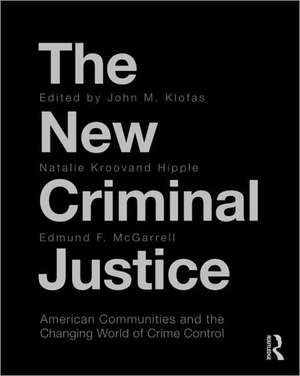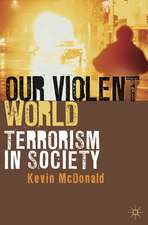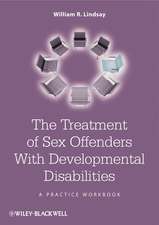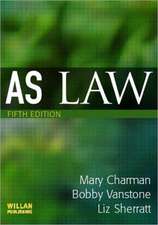The New Criminal Justice: American Communities and the Changing World of Crime Control: Criminology and Justice Studies
Editat de John Klofas, Natalie Kroovand Hipple, Edmund McGarrellen Limba Engleză Paperback – 23 feb 2010
- collaboration across agencies previously viewed as relatively autonomous
- a focus on location problems and local solutions rather than a widely shared understanding of crime or broad application of similar interventions
- a deep commitment to research which guides problem assessment and policy formulation and intervention.
| Toate formatele și edițiile | Preț | Express |
|---|---|---|
| Paperback (1) | 327.80 lei 43-57 zile | |
| Taylor & Francis – 23 feb 2010 | 327.80 lei 43-57 zile | |
| Hardback (1) | 1220.42 lei 43-57 zile | |
| Taylor & Francis – 23 feb 2010 | 1220.42 lei 43-57 zile |
Din seria Criminology and Justice Studies
- 15%
 Preț: 582.24 lei
Preț: 582.24 lei -
 Preț: 311.41 lei
Preț: 311.41 lei -
 Preț: 142.53 lei
Preț: 142.53 lei - 8%
 Preț: 391.95 lei
Preț: 391.95 lei - 8%
 Preț: 488.23 lei
Preț: 488.23 lei -
 Preț: 125.78 lei
Preț: 125.78 lei - 9%
 Preț: 640.26 lei
Preț: 640.26 lei - 8%
 Preț: 418.19 lei
Preț: 418.19 lei -
 Preț: 453.84 lei
Preț: 453.84 lei -
 Preț: 349.80 lei
Preț: 349.80 lei -
 Preț: 340.85 lei
Preț: 340.85 lei - 18%
 Preț: 1000.27 lei
Preț: 1000.27 lei - 15%
 Preț: 542.51 lei
Preț: 542.51 lei -
 Preț: 465.39 lei
Preț: 465.39 lei - 15%
 Preț: 578.93 lei
Preț: 578.93 lei - 22%
 Preț: 459.60 lei
Preț: 459.60 lei -
 Preț: 309.27 lei
Preț: 309.27 lei - 22%
 Preț: 431.22 lei
Preț: 431.22 lei - 5%
 Preț: 481.73 lei
Preț: 481.73 lei - 21%
 Preț: 421.03 lei
Preț: 421.03 lei -
 Preț: 449.72 lei
Preț: 449.72 lei - 18%
 Preț: 1116.02 lei
Preț: 1116.02 lei -
 Preț: 351.80 lei
Preț: 351.80 lei - 15%
 Preț: 624.48 lei
Preț: 624.48 lei - 15%
 Preț: 576.00 lei
Preț: 576.00 lei - 18%
 Preț: 808.08 lei
Preț: 808.08 lei -
 Preț: 382.91 lei
Preț: 382.91 lei
Preț: 327.80 lei
Preț vechi: 423.26 lei
-23% Nou
Puncte Express: 492
Preț estimativ în valută:
62.73€ • 65.66$ • 52.21£
62.73€ • 65.66$ • 52.21£
Carte tipărită la comandă
Livrare economică 31 martie-14 aprilie
Preluare comenzi: 021 569.72.76
Specificații
ISBN-13: 9780415997287
ISBN-10: 0415997283
Pagini: 192
Ilustrații: 15 tables and Follows Global Gender Research done by Swales Willis
Dimensiuni: 188 x 234 x 13 mm
Greutate: 0.34 kg
Ediția:1
Editura: Taylor & Francis
Colecția Routledge
Seria Criminology and Justice Studies
Locul publicării:Oxford, United Kingdom
ISBN-10: 0415997283
Pagini: 192
Ilustrații: 15 tables and Follows Global Gender Research done by Swales Willis
Dimensiuni: 188 x 234 x 13 mm
Greutate: 0.34 kg
Ediția:1
Editura: Taylor & Francis
Colecția Routledge
Seria Criminology and Justice Studies
Locul publicării:Oxford, United Kingdom
Cuprins
Section 1: The Changing World of Criminal Justice 1. The New Criminal Justice 2. Modeling the New Criminal Justice 3. Strategic Problem Solving in Criminal Justice Section 2: The New Criminal Justice in Practice 4. Building Successful Partnerships – Lessons from the Strategic Approaches to 5. Project Exile Gun Crime Reduction 6. Strategic Problem Solving Gun Crime Reduction 7. Identifying Effective Policing Strategies for Reducing Crime 8. The Drug Market Initiative in Rockford, Illinois Section 3: New Knowledge for New Practice in Criminal Justice 9. Action Research for Crime Control and Prevention 10. Added Value through a Partnership Model of Action Research 11. The Participation of Academics in the Criminal Justice Working Group Process 12. Collaborations between Police and Research/Academic Organizations. Some Prescriptions from the Field 13. The Challenge of Timeliness and Utility in Research and Evaluation Section 4: Some Final Thoughts on the New Criminal Justice 14. Accumulating Lessons from Project Safe Neighborhoods 15. Post Script. Teaching the New Criminal Justice
Notă biografică
John M. Klofas is professor of criminal justice, chairperson of the Department of Criminal Justice at Rochester Institute of Technology and Director of the Center for Public Safety Initiatives (CPSI).
Natalie Kroovand Hipple is a Research Specialist at the School of Criminal Justice at Michigan State University.
Edmund F. McGarrell is Director and Professor of the School of Criminal Justice at Michigan State University.
Natalie Kroovand Hipple is a Research Specialist at the School of Criminal Justice at Michigan State University.
Edmund F. McGarrell is Director and Professor of the School of Criminal Justice at Michigan State University.
Recenzii
"This extraordinary volume presents a description of a new cutting edge model of research on crime and our society’s efforts to reduce it. This work demonstrates that the criminal justice system is not a single funnel but a series of locally determined problems and locally crafted crime control responses that together determine CJ policy."—John McDevitt, Institute on Race and Justice, Northeastern University
"The New Criminal Justice proposes a model of cooperation and collaborative problem solving organizations that stresses multiplicative power rather than additive power, local focus rather than standardization and action research rather than basic research. This book will give students a much deeper appreciation of the complexities of the criminal justice system beyond the more simplistic systems approach."—James Meeker, Criminology, Law & Society, University of California, Irvine
"Klofas, Hipple, and McGarrell have expertly assembled an important collection of readings. These innovative articles together in one volume paired with helpful section overviews and discussion questions makes this a vital contribution to the field, and presents a possible paradigm switch in the way we should think about criminal justice."—Geoffrey Alpert, Criminology and Criminal Justice, University of South Carolina
"John Klofas, Natalie Hipple and Ed McGarrell have compiled an excellent volume, far more than just a collection of chapters. Like many edited books, there are outstanding contributions, with important findings and policy statements. Unlike most edited books, however, this volume highlights one of the most important new themes in criminal justice in the past decade. It is not an overstatement to say that this book lays out the model for the new criminal justice."—Scott H. Decker, Director,Criminology and Criminal Justice, Arizona State University
"This extraordinary volume presents a description of a new cutting edge model of research on crime and our society’s efforts to reduce it. This work demonstrates that the criminal justice system is not a single funnel but a series of locally determined problems and locally crafted crime control responses that together determine CJ policy."—John McDevitt, Institute on Race and Justice, Northeastern University
"The New Criminal Justice proposes a model of cooperation and collaborative problem solving organizations that stresses multiplicative power rather than additive power, local focus rather than standardization and action research rather than basic research. This book will give students a much deeper appreciation of the complexities of the criminal justice system beyond the more simplistic systems approach."—James Meeker, Criminology, Law & Society, University of California, Irvine
"Klofas, Hipple, and McGarrell have expertly assembled an important collection of readings. These innovative articles together in one volume paired with helpful section overviews and discussion questions makes this a vital contribution to the field, and presents a possible paradigm switch in the way we should think about criminal justice."—Geoffrey Alpert, Criminology and Criminal Justice, University of South Carolina
"The New Criminal Justice proposes a model of cooperation and collaborative problem solving organizations that stresses multiplicative power rather than additive power, local focus rather than standardization and action research rather than basic research. This book will give students a much deeper appreciation of the complexities of the criminal justice system beyond the more simplistic systems approach."—James Meeker, Criminology, Law & Society, University of California, Irvine
"Klofas, Hipple, and McGarrell have expertly assembled an important collection of readings. These innovative articles together in one volume paired with helpful section overviews and discussion questions makes this a vital contribution to the field, and presents a possible paradigm switch in the way we should think about criminal justice."—Geoffrey Alpert, Criminology and Criminal Justice, University of South Carolina
"John Klofas, Natalie Hipple and Ed McGarrell have compiled an excellent volume, far more than just a collection of chapters. Like many edited books, there are outstanding contributions, with important findings and policy statements. Unlike most edited books, however, this volume highlights one of the most important new themes in criminal justice in the past decade. It is not an overstatement to say that this book lays out the model for the new criminal justice."—Scott H. Decker, Director,Criminology and Criminal Justice, Arizona State University
"This extraordinary volume presents a description of a new cutting edge model of research on crime and our society’s efforts to reduce it. This work demonstrates that the criminal justice system is not a single funnel but a series of locally determined problems and locally crafted crime control responses that together determine CJ policy."—John McDevitt, Institute on Race and Justice, Northeastern University
"The New Criminal Justice proposes a model of cooperation and collaborative problem solving organizations that stresses multiplicative power rather than additive power, local focus rather than standardization and action research rather than basic research. This book will give students a much deeper appreciation of the complexities of the criminal justice system beyond the more simplistic systems approach."—James Meeker, Criminology, Law & Society, University of California, Irvine
"Klofas, Hipple, and McGarrell have expertly assembled an important collection of readings. These innovative articles together in one volume paired with helpful section overviews and discussion questions makes this a vital contribution to the field, and presents a possible paradigm switch in the way we should think about criminal justice."—Geoffrey Alpert, Criminology and Criminal Justice, University of South Carolina
Descriere
Criminal Justice in the United States is in the midst of momentous changes: an era of low crime rates not seen since the 1960s, and a variety of budget crunches also exerting profound impacts on the system. This is the first book available to chronicle these changes and suggest a new, emerging model of the criminal justice system.























